Where We Work
See our interactive map

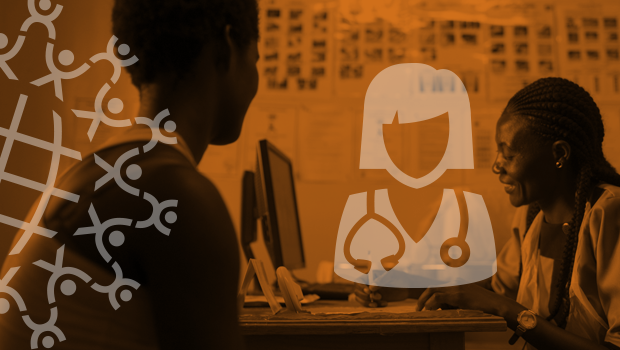
And why they wouldn’t want to do any other.
At IntraHealth International, we are dedicated to health workers. And now, as COVID-19 spreads around the world, health workers and the systems in which they work are more important than ever.
We are so proud of our staff who are working tirelessly during this outbreak, and always, to keep helping people, no matter what the circumstances.
As part of our celebration of World Health Worker Week 2020, we asked some of the many nurses and midwives of IntraHealth International what drew them to health care and what keeps them coming to work every day to put their lives on the line to save others. Here’s what they have to say.
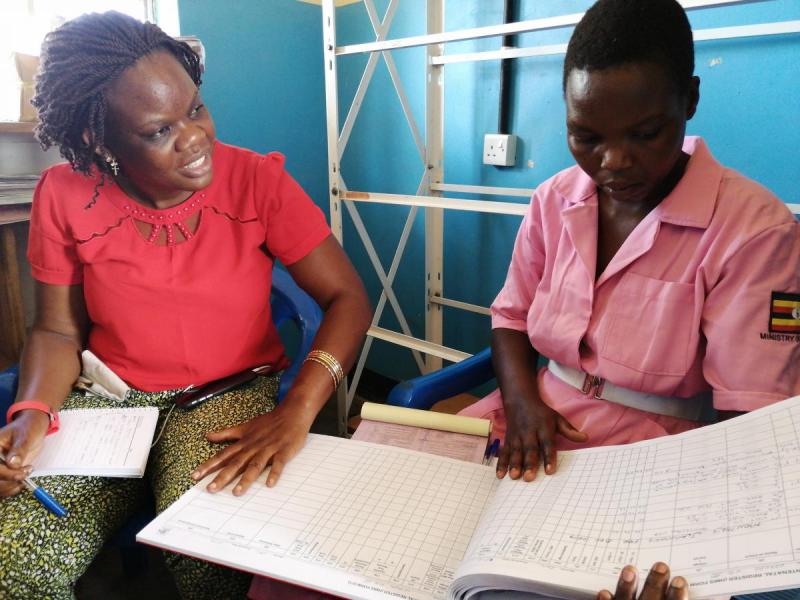
Eunice Esule (left) mentoring a health worker at the Lokopo Health Center III in the Napak District of Uganda. Photo courtesy of Eunice Esule for IntraHealth International.
When HIV/AIDS had just been discovered in Uganda, many people were shunned and did not get care. My mother opened our house to care for relatives who were infected because in those days, medication was not really available. It was very sad and painful, and I saw the stigma. No one from the community around us wanted to relate to us—we were condemned.
This inspired me to become a nurse and care for the people everyone neglected. One of my first jobs was in northern Uganda working with HIV-positive mothers to ensure they had HIV-free babies.
In Uganda, nurses are the backbone of the health system.
I’ve always been drawn to nursing because of the compassion. By training, nurses are taught to serve. They are always at health facilities to provide care to those who need it the most. In Uganda, they are the backbone of the health system. They are resilient and often very strong people. Most of the time, they work in resource-constrained facilities, learning to adjust to any situation. They are far away from social amenities, sacrificing their personal lives and their children’s personal lives to serve the population. They are in rural hard-to-reach health facilities doing 24-hour shifts day in and out and produce remarkable results, contributing to national performance numbers without praise.
Eunice works on the District Health Systems Strengthening on RMNCAH, HIV/AIDS and Nutrition in Karamoja project funded by the United Nations Children's Fund (UNICEF).
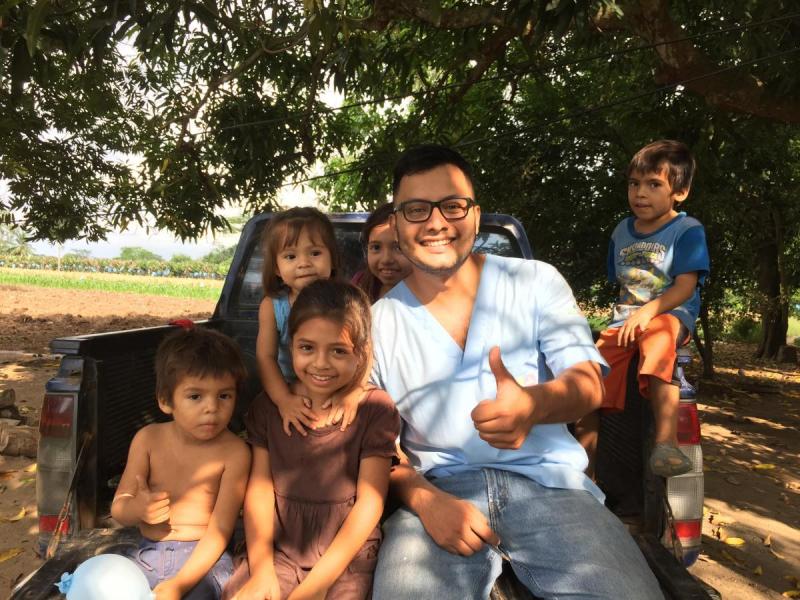
Cristian Castro. Photo courtesy of Cristian Castro for IntraHealth International.
Nurses and midwives provide humanized care. They understand how their clients operate and they provide care according to individual needs. They care for people of all ages, families, groups, and communities, sick or not, and in all circumstances.
After my brother died, I saw the good treatment that the nurses gave to my family and I wanted to return the service to society. I was motivated because I knew that nurses and midwives changed lives.
Cristian works on IntraHealth’s Latin America and the Caribbean projects.
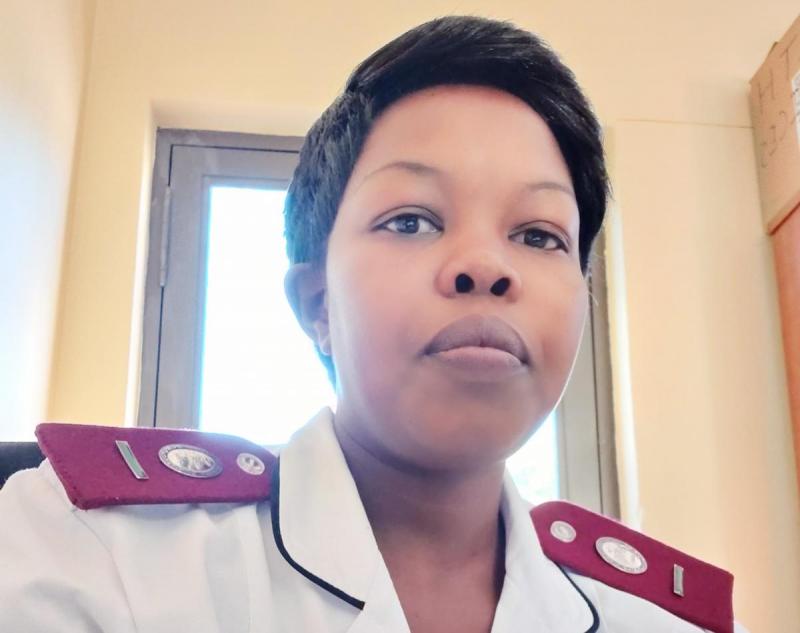
Irine Chelag’at Birir. Photo courtesy of Irine Chelag’at Birir for IntraHealth International.
When I was young, I wanted to be two things when I grew up: either a police officer or a nurse. I had neighbors whose daughters were both nurses and I really admired them. I applied to nursing school and when I received the acceptance letter in the mail, I was so happy. I was over the moon. The joy couldn't be described. So I completed my training and now work as a qualified, registered, and licensed nurse/midwife.
For me, nursing and midwifery is not just a profession, it’s a calling. Nurses attend to people who need help when no one else will. They sacrifice their sleep, listen to people’s stories, and attend to extremely sick people, including those with highly infectious diseases. The same person opens the eye of a newborn and closes the eyes of a dying person with dignity.
I am the future of nursing and midwifery.
This profession is hard. I often think about the nurses and midwives who have sacrificed their lives and died on the line of duty. During the Ebola crisis in the West African countries, a lot of nurses lost their lives. They are my inspiration.
Nursing and midwifery are professions that few people choose but I knew it was the one I wanted to do. It involves a lot of sacrifices and even more of prayers for our patients than for ourselves. But I know that I am the future of nursing and midwifery.
Irine works on the DREAMS project in Namibia. The project is funded by USAID and IntraHealth works in partnership with Project Hope Namibia, Katima State Hospital, and the Namibian Ministry of Health and Social Services.
 The purpose of a nursing is to care for others. I think that is the most beautiful thing a person can do because it can be done in so many different ways. But it’s a very difficult job.
The purpose of a nursing is to care for others. I think that is the most beautiful thing a person can do because it can be done in so many different ways. But it’s a very difficult job.
Every nurse that I know is my hero for the job that they perform, always putting the needs of others ahead of their own. Because not everyone does that. There are never special days or holidays for nurses because they are always there, ready to help, ready to advocate for the patient, their family, and community.
I think it is important that the authorities and society recognize the important job that nurses perform and the positive impact they have on society. Otherwise, nursing will continue to be classified as a profession without value in the background, which prevents us from advancing.
Dora works on IntraHealth’s Latin America and the Caribbean projects.
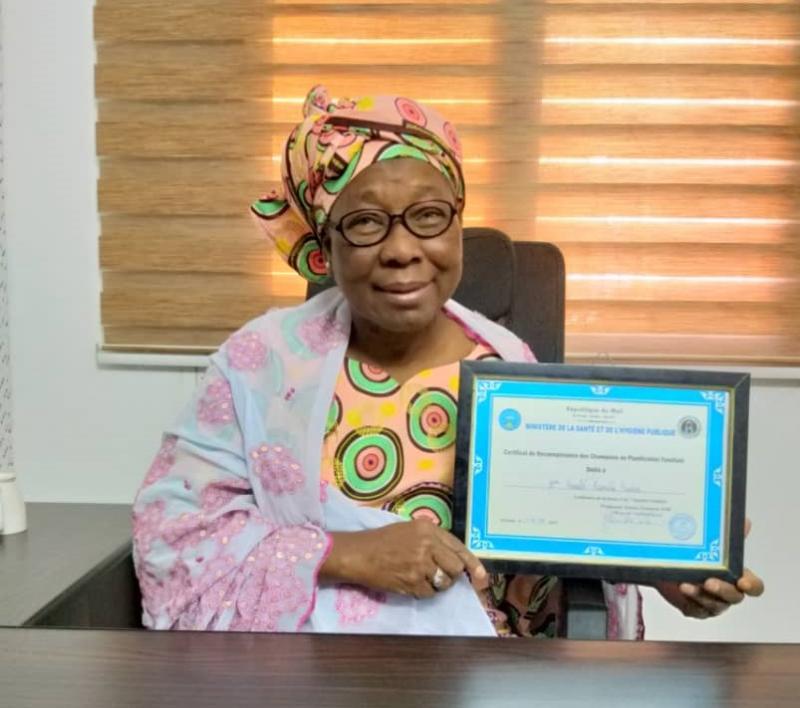
Ramatou Konaté. Photo courtesy of Ramatou Konaté for IntraHealth International.
When I was young, nurses would visit my school. I admired their work because they were very kind, treated us well, and gave us advice.
My older brother also used to tell me all the time, “You will become a health worker,” because of how I acted. I knew I wanted to be a midwife but not everyone can be one. It takes love of the profession and one's own values. It’s important to apply the principles of ethics and justice, offer humanized care throughout labor—reassure the woman giving birth, be gentle and professional, communicate with her, advise her, support her, respect her rights and confidentiality.
But it’s also about the community. We ensure the proper planning and implementation of maternal and child health activities in health districts and community health centers. We help develop and apply reproductive health protocols and procedures, including the responsibilities of the midwife. We help develop and apply training documents, collect and analyze activity data, and prepare reports for better decision-making.
The future of nursing and midwifery starts with women.
I learned this from my role model, Aminata. She was my coach when I was in family planning and reproductive health training. She always impressed me with her patience, her willingness to share knowledge, and her openness. She was a clear model for me of how to act in the profession.
And I hope young women have the same opportunity to learn from others as I did. Because the future of nursing and midwifery starts with women. They must remember that the love of the profession and its value contributes to its beauty and nobility. As a Bambara proverb says, "Giving life is an uncertain journey." These 42 years have allowed me to help women have healthy babies and healthy lives.
Ramatou works on IntraHealth’s Human Resources for Health Strengthening Activity in Mali with funding from USAID.
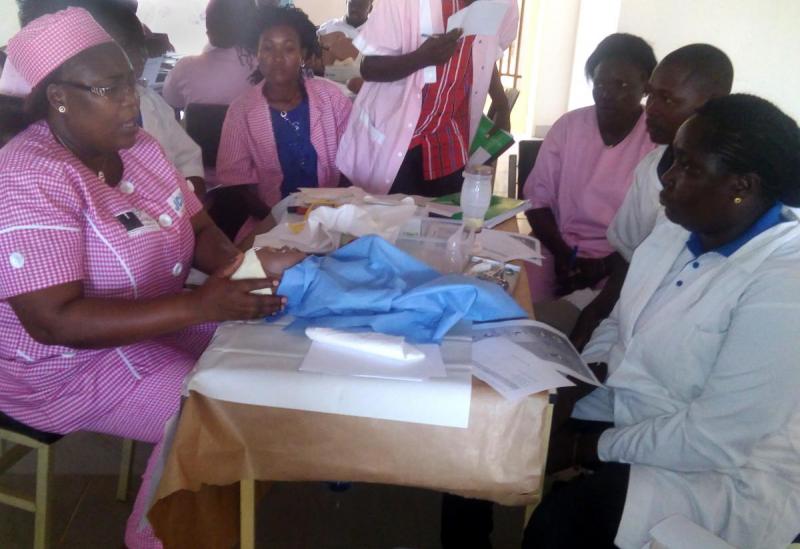
Lamoussa Georgette Nikiema Zerbo training maternity providers on how to resuscitate newborn babies. Photo courtesy of Lamoussa Georgette Nikiema Zerbo for IntraHealth International.
I was drawn to the pink blouse—the beauty and the nobility of the midwife. I especially wanted to help women. I wanted to help them give life and take care of their children, families, and the community.
I always think about the women I look up to, especially one, a professional midwife who is a leader and always ready to sacrifice herself for the happiness of all. And I think about the new generation of nurses and midwives who, like me, will have to learn to do everything possible to offer high-quality obstetric and nursing care, to listen to women and children, to be leaders and to value their practice, and to establish an intergenerational bridge for quality and continuity of care.
Lamoussa works on The Challenge Initiative in collaboration with the Bill and Melinda Gates Institute and with funding from the Bill & Melinda Gates Foundation.
At IntraHealth, our heroes are the health workers on the front lines who risk everything to save lives. During the COVID-19 pandemic, we are so proud of every health worker and are working to keep them safe during this outbreak so they can keep helping people around the world.
This piece is part of IntraHealth's celebration of the Year of the Nurse and the Midwife and World Health Worker Week (April 6 – 11, 2020). Follow our series on nurses and midwives and see how the Frontline Health Workers Coalition, IntraHealth International, the World Health Organization, and other partners are honoring leaders on the line here. #HealthForAll! #WHWWeek #HealthHeroes #HealthWorkersCount #NursesLead #MidwivesLead
Get the latest updates from the blog and eNews




